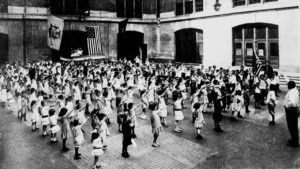NOTE: Our ongoing conference on civil liberties continues this evening with a presentation by the inimitable Judge Andrew Napolitano, one of the most ardent and eloquent defenders of civil liberties in our time. You don’t want to miss this one! Via Zoom at 7 p.m. Eastern time. To receive a Zoom link, register at our conference web page. A Q&A session will follow the judge’s talk. I will be the moderator. I hope to see you there for what promises to be another fantastic presentation.
************
Statists all across the country are going to war with each other over which books will be permitted to be placed in public (i.e., government) school libraries. Their mindsets are so mired in statism that they cannot see there is no possible way to resolve their war in a way that will make everyone happy.
What they fail to realize is that their basic paradigm for education — that the state should be educating children — is the real problem. As long as the state is in charge of education, there will always be fierce political battles over which textbooks will be used, which books should be in the library, and what should be taught in the classroom.
Moreover, the majority will rule. It might be a majority of school board members at the local level making the decisions. Or it might be a majority in the state legislature. Or a majority at the state board of education. All of these people, of course, are either elected or appointed through the political process.
Whichever side is in the majority, they will be happy that their book selections have prevailed. Whoever is in the minority will be unhappy and will cry censorship. The political battles will continue, with each side fighting hard to get their people elected or appointed to public office.
Religious liberty
Thank goodness for the First and Fourteenth Amendments. Those two amendments prohibit the states from involving themselves in religious affairs.
Imagine if we didn’t have those two express prohibitions. We would be experiencing the same types of fierce political wars in religion that we are experiencing in education. There would be battles over what religious books to promote or display in churches. There would also be fights over which version of the Bible to use. People would be battling over which religious doctrines to adopt. There would be forever wars over the format for Sunday services. There would be compulsory church attendance laws for children, as well as church buses to transport them to church. There would undoubtedly be battles over whether to adopt a system of church vouchers or charter churches.
There would be locally elected religious boards, similar to school boards. There would be a state board of religion. There would be fiercely fought political races, with candidates’ religions being an important factor in the electoral campaigns.
None of those religious battles exist for one reason: the states are prohibited from involving themselves in religion. Instead, there is a multiplicity of churches and religions from which people can choose. If they don’t like what is happening or being taught in one church or religion, they can move to another one. People are not able to impose their religious views on others through majority vote.
Separate school and state
That’s the only permanent solution to the book controversy in public schools. Rather than engage in nasty political wars over which books to include in the school library, over which doctrines are going to be taught in the classroom, or which textbooks are going to be used, just separate school and state, just as our ancestors separated church and state.
With a free-market educational system, it would be like it is in religion. People would be free to select the school or educational vehicle of their choice. If they don’t like how a school is operating, what it is teaching, or what books it is using, they are free to simply move to a different school, one that better reflects their values.
Thus, Americans have two choices: (1) maintain the statist status quo and engage in endless political battles in education or (2) separate school and state and bring peace, harmony, and education to society.
For a deeper understanding of the concept of educational liberty, see FFF’s award-winning book Separating School & State: How to Liberate America’s Families by Sheldon Richman.




